#vedic mythology
Text
Nakshatra Convertor
1) Ashwini:
“Born from a female horse”
Ruling planet= Ketu
Aries 0° to Aries 13°20’ (Sidereal)
2) Bharani:
“The Bearer”
Ruling planet= Venus
Aries 13°20’ to Aries 26°40’ (Sidereal)
3) Kritika:
“The Cutters”
Ruling planet= Sun
Aries 26°40’ to Taurus 10° (Sidereal)
4)Rohini:
“The growing one”
Ruling planet= Moon
Taurus 10° to Taurus 23°20’ (Sidereal)
5) Mrigashira:
“The Deer’s Head”
Ruling planet= Mars
Taurus 23°20’ to Gemini 6°40’ (Sidereal)
6) Ardra:
“The Damp One”
Ruling Planet= Rahu
Gemini 6°40’ to Gemini 20° (Sidereal)
7) Punarvasu:
“The return of the light”
Ruling Planet= Jupiter
Gemini 20° to Cancer 3°20’ (Sidereal)
8) Pushya:
“The Nourisher”
Ruling Planet= Saturn
Cancer 3°20’ to Cancer 16°40’ (Sidereal)
9) Ashlesha:
“The Entwiner”
Ruling Planet= Mercury
Cancer 16°40’ to Cancer 30° (Sidereal)
10) Magha:
“The Mighty”
Ruling Planet= Ketu
Leo 0° to Leo 13°20’ (Sidereal)
11) Purva Phalguni:
“The Lucky One”
Ruling Planet= Venus
Leo 13°20’ to Leo 26°40’ (Sidereal)
12) Uttar Phalguni:
“The Auspicious One”
Ruling Planet= Sun
Leo 26°40’ to Virgo 10° (Sidereal)
13) Hasta:
“The Hand”
Ruling Planet= Moon
Virgo 10° to Virgo 23°20’ (Sidereal)
14) Chitra:
“The Bright One”
Ruling Planet= Mars
Virgo 23°20’ to Libra 6°40’ (Sidereal)
15) Swati:
“The Independent One”
Ruling Planet= Rahu
Libra 6°40’ to Libra 20° (Sidereal)
16) Vishaka:
“The Forked One”
Ruling Planet= Jupiter
Libra 20° to Scorpio 3°20’ (Sidereal)
17) Anuradha:
“Subsequent success”
Ruling Planet= Saturn
Scorpio 3°20’ to Scorpio 16°40’ (Sidereal)
18) Jyeshtha:
“The Eldest”
Ruling Planet= Mercury Ketu Peak Exaltation, Rahu Deep Debilitation
Scorpio 16°40’ to Scorpio 30° (Sidereal)
19) Moola:
“The Root”
Ruling Planet= Ketu
Sagittarius 0° to Sagittarius 13°20’ (Sidereal)
20) Purva Ashadha:
“The Undefeated”
Ruling Planet= Venus
Sagittarius 13°20’ to Sagittarius 26°40’ (Sidereal)
21) Uttar Ashadha:
“Later Victory”
Ruling Planet= Sun
Sagittarius 26°40’ to Capricorn 10° (Sidereal)
22) Shravana:
“To Listen”
Ruling Planet= Moon
Capricorn 10° to Capricorn 23°20’ (Sidereal)
23) Dhanishta:
“The Most Famous”
Ruling Planet= Mars
Capricorn 23°20’ to Aquarius 6°40’ (Sidereal)
24) Shatabhisha:
“Hundred Healers”
Ruling Planet= Rahu
Aquarius 6°40’ to Aquarius 20° (Sidereal)
25) Purva Bhadrapada:
“First of the Blessed Feet”
Ruling Planet= Jupiter
Aquarius 20° to Pisces 3°20’ (Sidereal)
26)Uttar Bhadrapada:
“Second of the Blessed Feet”
Ruling Planet= Saturn
Pisces 3°20’ to Pisces 16°40’ (Sidereal)
27) Revati:
“The Shining One”
Ruling Planet= Mercury
Pisces 16°40’ to Pisces 30° (Sidereal)
Abhijit Nakshatra:
“Ultimate Victory”
Ruling Planet= Mercury
(Intercalary Nakshatra) Capricorn 6°40’ to Capricorn 10°53’20’’
#astro#astro community#astro notes#astro observations#astrology#zodiac#zodiac signs#astrology notes#astrology observations#vedic chart#vedic astro observations#vedic astro notes#vedic texts#vedic mythology#vedic astrology#lagna#nakshatras#astro placements#astroblr#aries moon#taurus moon#gemini moon#cancer moon#leo moon#virgo moon#libra moon#scorpio moon#sag moon#capricorn moon#sagittarius moon
642 notes
·
View notes
Text
Vedic Astrology Observations
Ketu Dominant Men

(GIF context: This GIF shows Jamie Dornan [Magha Moon] in 50 Shades of Grey, which has heavy themes of both Ketu and Mercury– Magha and Ashlesha.)
Ketu or "Chaya Graha", envisaged as the dragon's tail or a headless form, is a symbol of the utmost spiritual significance in Vedic astrology. It is the shadow planet representative of the South Node of the Moon, and it has the most significant karmic role. Ketu represents the process of spiritual growth that comes from isolation, detachment, and renunciation. Through the immersion of intuition and ascetic practices, Ketu facilitates the shedding of life's illusions and aids in the journey towards spiritual enlightenment, demonstrating how its influence tends to embody the more complex and often challenging aspects of the human experience on the path to spiritual release. In the kundli (birth chart), wherever Ketu is placed signifies where the soul is stripped of its external dependencies and illusions. Simultaneously, the placement of Ketu indicates where one possesses natural power brought into this incarnation from a previous mastery in prior lifetimes. Tapping into this energy requires a process of purification, where one is compelled to let go of attachments, desires, and even identities that no longer serve spiritual growth. This celestial influence, while guiding us towards spiritual enlightenment through the accumulation of past knowledge and garnered lessons, is regarded as a malefic influence. It is often associated with the idea of sabotage or obstruction in one’s material life. Ketu's malefic character can be understood as a necessary catalyst for transformation. Just as a dragon's tail signifies the end of a creature and a headless form denotes a lack of conventional sensory perception, Ketu's influence is about the cessation of the familiar, more comfortable aspects of life. This nature of Ketu reflects the complicated and somewhat paradoxical journey of spiritual growth. Similar to Rahu, it challenges individuals by disrupting the status quo in ways that may initially appear destructive or sabotaging. These disruptions are not arbitrary, however; they are purposeful, forcing introspection and reassessment of one's life path for the sake of uncovering higher truth.
Ketu, in Vedic astrology, holds a significant influence on an individual's personality and life path, and this influence extends distinctly to Ketu-dominant men, distinguished by having primary placement(s) in either of the three Ketu ruled nakshatras: Ashwini, Magha, or Mula. Ketu's dominance in a chart often results in a personality that sets people apart in their approach to life, relationships, and self-expression. While many of these observations may apply to both men and women, there are particular traits and tendencies that seem to be more pronounced in Ketu dominant men that I'd like to focus on. By looking at the examples given in this post, I hope you'll be able to look at Ketu a bit more clearly through the expression of its natives.
(GIF contexts: First one is of Alexander Skarsgard [Magha Sun, Moon, and Asc. If you want to understand magha in men, study this guy, lol. The second GIF shows Daniel Gillies [Magha Moon and Ashwini Jupiter.])
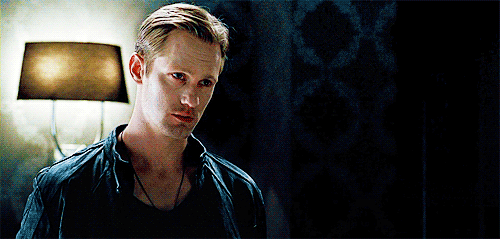

In Vedic astrology, Ketu's influence in Ashwini Nakshatra creates distinctive qualities in men under its sway, embodying a dynamic and vivacious essence. This nakshatra conveys notions of speed, agility, vitality, courage, and tenacity, traits deeply ingrained in Ashwini men. They are often perceived as energetic and quick in thought and action, carrying a persistent zest for life that propels them towards new ventures and experiences with remarkable swiftness. This Nakshatra, associated with the Ashwini Kumaras – the twin horsemen sons of Surya (Sun god) known for their healing prowess in Vedic mythology – bestows upon its natives a natural inclination towards healing and rejuvenation, be it in physical, emotional, or spiritual contexts. Ashwini men exhibit an adventurous spirit and a curiosity that extends beyond the physical and into spiritual and intellectual explorations. However, this constant pursuit of novelty can manifest as a tendency towards restlessness or impulsivity, which can be particularly dangerous given Ketu's theme of temptation and continual transformation. Ashwini's initiatory nature also comes with the caveat of dropping old paths and starting again. The influence of Ketu in this nakshatra forces new beginnings, and sometimes this can be harsh for the natives and those around them, since it can feel like they are not really present unless there is fresh excitement. They can be sort of "hit it and quit it" when it comes to many different things in their lives, and you will have to look to different areas of the chart to see if they can be "tamed" so-to-speak. Ashwini Nakshatra also holds a special significance as it is the exaltation point of the Sun, a factor that adds another layer of complexity to Ketu's influence in this nakshatra. The Sun's exaltation in Ashwini indicates a nature compatible and conducive to the energy of the Sun, which is known for its righteous purity and expenditure of energy in addition to its scalding nature when things get too close. Since Ketu cannot provide or reflect its own light, its ability to give energy will depend on the planets it is with and the energy it absorbs from others (but it will do best by itself realistically). This will inevitably create a sense of exceptional vitality, confidence, and a strong sense of self for these individuals. Ketu's celestial alignment with the Sun in this nakshatra suggests that, while Ashwini brings qualities of introspection and spiritual inclination (especially as it relates to initiatory beginnings), they also possess a powerful presence, an ability to lead, and a radiant quality symbolistic of inborn power. In essence, the exaltation of the Sun in Ashwini Nakshatra can bring forth a unique archetype of individuals who are not only seekers and healers but also leaders and changemakers.
(GIF contexts: The first GIF shows Dwayne Johnson [Mula Moon]. The second one shows Arnold Schwarzenegger [Mula Moon]. I am fairly certain both have been open about being naturally fit but then eventually switching to steroids)


Magha Nakshatra is characterized by themes of royalty, nobility, and the ancestral lineage, standing as a testament to the "mighty one." Symbolized by the royal throne, Magha is connected to themes of authority, power, and respect for tradition. The symbol of this nakshatra is the royal throne, and the ruling deity is Pitris, which are the ancestors. These signify natives who will have a deep connection to their ancestors and will receive blessings of power because of this. Men under the influence of Magha Nakshatra often display a reverence for their heritage, showing a notable pride in their ancestry and a commitment to preserving the legacy bequeathed to them through generations. This reverence for lineage is more than a nod to status or pride; it's an acknowledgment of the wisdom, duties, and responsibilities inherited from their forebears. Ketu's influence in Magha enhances the introspective and spiritual facets of these individuals, urging them to explore the meaning of existence beyond the mere physical realm. They often exhibit a strong inclination toward exploring rituals, history, and metaphysical truths, seeking to understand their place within the cycle of life and death. Magha men often possess an inherent sense of authority and a demeanor that commands respect, often finding themselves in roles that allow them to exert significant influence and guidance over others from their drive for power and recognition (one example of this is Donald Trump who has Magha ascendant, but I would not consider him Ketu dominant). Their leadership comes from a dignified bearing and nobility, reflecting Magha's royal "kingly" symbolism. Additionally, these natives are very creative and habitual. They are guided by their intuition, which taps into Leo's vibrant reservoir of artistic flair and inventive fervor. This intuitive connection fuels their desire to engage with the world in a way that feels instinctive and natural, allowing them to operate almost on "autopilot," where they do much the same things day after day so that they can free up their mind to focus on aspirations they consider more important. Such an approach enables them to withdraw into their inner worlds, providing a sanctuary where they can be free from the burdens of planning or deliberate thinking.
The final and most refined Ketu-nakshatra, Mula, encapsulates the essence of transformation and an unyielding pursuit of truth. Its ruling deity, Nirriti, is the goddess of destruction and dissolution, playing an important role in its influence on this nakshatra and its natives. Represented by the root of a plant, Mula signifies the foundation, inception, and the most profound layers of being. Men influenced by Mula Nakshatra are distinguished by their urge to unearth the underlying truths of life, a quest that compels them to probe into and understand life's most fundamental elements. These individuals are propelled by a need for authenticity and are often involved in tearing down superficial or outdated structures to rebuild more meaningful and genuine ones. This can make them seem intense or extreme, but their actions are motivated by a sincere desire to uncover and establish truths. Their journey is one of continuous transformation with phases of destruction and rebirth, reflecting the cycle of life itself. This endeavor is challenging and demands courage, as it often entails venturing into the obscure and uncharted territories of the psyche and the external world. Such journeys can be as unsettling as they are transformative, leading to significant upheavals. Being at the height of its expression and the final gandanta, Mula personifies the essence of Ketu in its most powerful manifestation, showing its natives as relentless seekers of the hidden, uncomfortable truths that lie at the very heart of existence. Their journey is one of perpetual evolution, driven by the need to strip away all that is insubstantial to reveal the core truths that make up the cosmos at large.
(GIF contexts: The first one shows Jonathan Rhys Myers [Mula Moon and Asc.] The second one shows Cillian Murphy [Ashwini Moon]. The third one shows Milo Ventimiglia [Ashwini Moon.])



Individuals with a dominant Ketu as a whole in their astrological charts exhibit a character depth that is both remarkable and elusive. Their disposition, heavily influenced by introspection and a pronounced spiritual bent, markedly differs from the traits typically associated with other planetary dominants. Such individuals often exude an air of understated simplicity, coupled with an inherent complexity that defies superficial expectations. The influence of Ketu in their lives is distinct and potent, shaping their perspectives and actions in unique ways. For example, these Ketu-dominant individuals frequently exhibit a noticeable disengagement or indifference towards conventional societal success metrics and rules, such as material wealth, status, or typical career achievements and are more focused on base survival. However, this lack of interest does not necessarily preclude them from attaining these successes. In fact, their innate ability to unearth concealed truths often positions them as agents of significant change or realization in others, providing them with a unique form of attention and influence. This laissez-faire attitude towards success and rules in addition to their ability to attract and channel energy from their surroundings can paradoxically lead them to positions of immense power, despite an apparent absence of traditional discipline and seriousness often observed in most other leaders. Their ascent to such roles can seem almost suspicious, calling to question the subtle yet powerful influence of Ketu in their personal and professional trajectories as it relates to subverting the rational mind.
In social contexts, Ketu-dominant men command a subtle yet significant influence, characterized by an allure that is both captivating and somewhat unnerving. In gatherings, they might not be the most vocal figures, yet their impact is tangible, drawing admirers and leaving a memorable imprint on those they encounter. This influence resembles a kind of gravitational force, attracting people not through an assertive persona but through the depth of their character. People in the vicinity of Ketu-dominant men often feel an inexplicable urge to confide in them or seek guidance, perceiving a hidden wisdom. However, this magnetic pull can also lead to a dynamic where others project their desires onto these men, interpreting their enigmatic, void-like nature as a blank slate for their emotional or psychological needs. This phenomenon is particularly pronounced with Mercury-dominant and Moon-dominant women, who are drawn to these men, sometimes mistaking the serene stillness of Ketu for the intense solar energy associated with a solar mastered masculine principle. Such misinterpretations can give rise to complicated interpersonal relationships, where Ketu-dominant men become the unintended focal point of intense expectations or emotions from others. Their role in social groups often hinges on their capacity to absorb and subtly influence the energies around them. This makes them effective, albeit unobtrusive, leaders, advisors, or agents of change. They possess an ability to uncover truths and insights that might elude others, and this gives them power to understand, influence, and transform the energies around them in drastic ways.
Broadly speaking, the energy absorption characteristic of men with a dominant Ketu often translates into a desire for activities that enhance their physical vitality, giving them the ability to store more and consume more excess energy. A significant number of these men gravitate towards bodybuilding among other intense fitness regimens, and even those who do not actively engage in such pursuits will still often possess well-defined physiques, simply because they are predisposed to having to rely on others. This tends to evoke extreme envy in other men who typically idolize their appearance similar to the way they do with Saturn men, but even more so, because Ketu isn't restricted in the same way Saturn is. Ketu isn't the type that is working out 5 days a week, maintaining a strict diet to stay in shape, and putting in the time and effort to rise to a position of authority. It is more like eating whatever they want and barely exercising to somehow still maintain a six pack (and taking steroids) and being stumbled upon by a modeling agent who signs them out of the blue (this reminded me of that one guy, Jeremy Meeks, who was arrested and became a model from his mugshot He has Jupiter in Mula). This physicality, however, is just one facet of their widespread appeal. These individuals are also often the subjects of envy for their innate stillness and detachment, traits that enliven them with a magnetic quality. This magnetism, ranking them as one of the most heated polar influences second only to the sun, manifests in a presence that is both captivating and subtly disquieting, affecting others on a deep, subconscious, and often uncomfortable level. The allure of Ketu-dominant men does not stem from their vibrance or charisma in the conventional sense like it does with other heated planets such as Mars; rather, people are drawn to them out of a sense of obligation or a feeling that they should offer everything within their means to these individuals, sensing unconsciously that they are dependent on energy exchange. This dynamic is reminiscent of an authority figure who commands an obsessive following, akin to a revered boss to whom everyone wants to offer gifts, engage in discussions, seek approval from, or in extreme cases cross professional boundaries with. Their natural Tamasic disposition, which requires external sources of vitality to sustain itself, inevitably attracts individuals ready to lavish them with excess energy and resources. However, this can be a double-edged sword. The instinctual adoration they receive, a facet of Ketu's malevolent influence towards the native acting as temptation from their spiritual purpose, can lead them down more sensual and materialistic paths, particularly if not moderated by external forces. This situation is comparable to enabling a drug addict’s harmful habits, where indulging their vices and forgiving them in moments of weakness exacerbates their challenges rather than aiding recovery. This example is especially critical to consider, seeing that Ketu natives' susceptibility to losing themselves in substances like drugs and alcohol that cloud the conscious mind is extremely high. These are the type of individuals to indulge in these types of things like drinking, smoking, or whatever else they can use to blot out their sense of identity–much more than they probably should. Recognizing and addressing this vulnerability is important, as it plays a significant role in their journey, particularly when they are eventually compelled to confront the repercussions of their actions when led down the wrong path. When Ketu dominant individuals engage excessively in materialistic pursuits rather than in intuitive self-exploration, they often find themselves mired in dissatisfaction and left with a sense of emptiness that they struggle to comprehend.
The enthralling influence of Ketu can have a major impact on those around them, sometimes leading to attempts by others to remodel themselves to better align with the preferences of the Ketu-dominant person. This adaptation often entails the erosion of personal boundaries and the suppression of self-preservation instincts, driven by an overwhelming fascination or obsession with the Ketu individual. It is almost like they are cult leaders who, without trying, command power over others. This phenomenon mirrors certain dynamics observed with Moon-dominant individuals, who are recognized for their emotional depth, capacity for nurturing, and power over the masses, but Ketu's influence pushes this to another level entirely. The power wielded by Ketu-dominant individuals, therefore, transcends mere emotional or even subconscious manipulation or influence; it taps into a more fundamental level of interaction, where the boundaries between self and other blur. This positions Ketu-dominant individuals, especially men, as extremely influential figures in the lives of those they interact with, capable of inspiring unsettling transformations in their admirers and followers.
Ketu-dominant men have a tendency to be more explicit in their expression of sexuality, occasionally casting a sexual hue over interactions that are otherwise non-sexual, through both overt and subtle displays. This pronounced sexualization of their interactions and aspects of their persona is reflective of their complex nature and serves as a method of attracting others for the purpose of energy exchange. They often utilize their physical presence and sexual magnetism as mechanisms to draw others into their orbit, encouraging an exchange of energy that transcends mere physical attraction. However, this aspect of their identity, while significant, can overshadow other dimensions of their personality. The focus on their sexual allure and the power dynamics it engenders contributes to a skewed perception of their character, often magnifying the "bad boy" archetype they follow. This label stems from societal expectations and projections rather than the individual's authentic self. In reality, many Ketu-dominant men may not inherently embody the dark or mysterious persona often ascribed to them; rather, they seek normalcy and genuine connection. It is just that they struggle to do so due to the intensity of Ketu leaving them bereft of normalcy. The misalignment between perception and reality can lead these individuals to be pigeonholed into roles that don't fully resonate with their true selves from an early age, compelling them to navigate a complex social landscape that emphasizes their sexual persona and outward eccentricities over their true identity.
(GIF contexts: The first one shows Justin Timberlake [Mula Moon and Magha Asc] and Mila Kunis in Friends with Benefits. If you have not seen it, their "arrangement" basically overly gets complicated because it gets too emotionally intimate and intense for them. The second one shows Jared Leto as Joker in suicide squad. I think this is a good example of how people tend to perceive these people as being darker than they really are and get casted in roles that emphasize their darker aspects. It's also fitting that the Joker just wanted to be alone but has Harley Quinn constantly chasing after him.)


When Ketu dominant individuals are more aligned with their purpose and resist extreme temptations, their interests often veer towards spiritual, creative, or philosophical domains. In these areas, they seek deeper, existential meanings and truths. Their pursuit of understanding the subtle intricacies of existence frequently leads them to explore unconventional paths, whether it be in metaphysics, the occult, philosophy, religion, or other subcultural movements that provide them with a sense of purpose. In environments where superficial interactions are commonplace, these individuals may not be easily understood or appreciated. Their depth and complexity demand more than superficial engagement for true comprehension, but most people should be wary of this, as like I said they can seem simple and grounded but will shake up your life in more ways than what you're probably wanting. Nonetheless, there remains a tendency for people to be drawn to these individuals, often submitting to their enigmatic draw they have that makes people stop thinking so much about rationality. This attraction, however, can sometimes result in Ketu dominant individuals being perceived as aloof or controlling, which is a misinterpretation of their true nature. Their apparent detachment is not indicative of a lack of empathy or a desire to dominate (they really don't want any control; people just give it to them). Instead, it stems from their intense internal focus and the ongoing process of inner development and self-realization. Their internal journey is a reflection of their outer nature, often misunderstood by those who only engage with them on a surface level. The depth of a Ketu dominant person's introspection and quest for understanding transcends the ordinary, making them complex figures who navigate their existence in ways that are not immediately apparent to the casual observer. Their journey is not just about self-discovery in terms of labels or findings one's place in the material world but also about how this internal transformation manifests in their interactions with theirs and other peoples' spirits.
Ketu dominant men often have compelling and unique perspectives on life and relationships, favoring deeply meaningful connections over temporary, superficial ones, which is usually what people want them for. Not many people can handle giving their energy away constantly, so even though it can feel like you want to give everything you have to them, when you have nothing left to give and they still aren't satisfied, it will start to take a toll on even the most fortified levels of patience. Their approach to love and relationships is characterized by a certain, shall I say... unpredictability; they are known for oscillating between periods of intense engagement and phases of extreme solitude. This pattern, which might resemble love bombing to certain people, reflects their struggle to balance their rich inner world with external relationships. These relationships are crucial for their vital energy management, yet maintaining them can be challenging due to their inward focus. In the context of friendships and family relationships, Ketu dominant individuals often appear to be on the receiving end more than anything. They can recycle energy they get from other sources to redirect it, but they'll get burnt out fairly quickly if others are not also consistently pouring themselves into these people. They maintain an aura of mystery, even among those closest to them because they can go from being hyper-social to complete hermit at the drop of a hat, in addition to being completely different in their heads compared to how others perceive them. Their approach to relationships deviates from the traditional, being more aligned with spiritual and intuitive interpretations of connections rather than conventional societal norms. This unconventional approach to relationships often leads to associations of then with the concept of "Twin Flames," likely due to the intensity and depth of connections they forge, but I wouldn't say these are particularly unique experiences to have with these people. They are just generally intense when it comes to everyone. Speaking of this, they will often be the ones to initially pursue the relationships with someone they want (including the women) and can be very persistent at it. They can become a bit overbearing, since in instances like that people initially were willing to give them energy but then started getting followed as they pulled away (kind of like having a stray dog follow you home after you feed it that can become aggressive if you don't continue to take care of it [while it may or may not destroy your home]; just a metaphor; it is not meant to be derogatory in any way-- some people can handle it and will love to do that, and it helps if they have more sattvic energies to balance it out so that it isn't super demanding). Anyway, back to the matter at hand. Yeah, they are typically the one's to initially pursue relationships with the people they want. Ketu dominant men are typically drawn to partners who share a similar depth and understanding of life in addition to their willingness to provide for him (this doesn't always mean financially; they can be very financially well off but still need a lot of attention, sex, etc. because they need energy exchange to function.) However, their compelling nature tends to attract a diverse array of individuals, many of whom may attempt to pretend to be someone they are not to align with the Ketu individual's desires, often at the cost of engaging in a sort of unspoken rivalry, where people stake claim to the Ketu person. This phenomenon demonstrates the effect of Ketu dominant individuals and those drawn into their orbit, highlighting the intricate dance of identity and adaptation in their relationships and the intensity people have a hard time understanding rationally. Their journey in love and companionship is not just about finding a compatible partner but also about navigating the intricate dynamics that their nature inevitably invites.
(GIF contexts: The first is of Chris Pine in Wonder Woman. I looked specifically for this example because I remember watching this and thinking how odd it was for him to make this otherwise normal scene so sexually intense, looking at Diana while standing there naked and commenting on being "above average." The second one pretty much speaks for itself, lol, and is of Eddie Cibrian [Mula Moon]. The third is of Derek Hough [Ashwini Moon and Mercury]. The fourth is Mickey Rourke [Magha Moon]).




Ketu-dominant men often personify the archetype of the solitary seeker, captivating everyone's attention despite their preference for solitary introspection. They mirror the essence of an isolated mystic or artist that people are still obsessed with, drawing people to them who feel a compelling need to help them exchange energy in various forms (while I was kind of just exploring this thought, it reminded me of the Lion from Sing 2 played by Clay Calloway and the movie showed them going out in the middle of nowhere to go get him for their concert, and it turns out he has Mula Sun). This dynamic resembles the experiences of being famous, where, irrespective of one's desire for privacy, there is a constant pull from others to engage in some form of energy exchange, be it through a photograph, a conversation, a performance, or more intimate interactions. This intensity of interaction can be overwhelming and is a testament to the powerful presence these individuals possess.
In their professional lives, they may gravitate towards roles that favor deep analysis, solitary work, or engagement with the metaphysical aspects of their field, but there are usually still aspects of power – be it as researchers, healers, spiritual leaders, or creative artists. Their approach to relationships and social interactions is apparent from a discernible depth; they are the individuals who, at gatherings, might be found in the center of everything even though they were just trying to sit in a quiet corner to have a deep conversation with someone else. Preferring the sanctity of their personal space, they also might not even attend even though people will still try to drag them out. With the sun, it is more direct and will burn people that get too close, whereas for Ketu it can become draining and overly intense in the sense of Ketu men's piercing ability to reveal hidden truths. It demonstrates the paradox of their existence: while they are naturally inclined towards isolation and introspective pursuits, their fundamental nature attracts others who seek to either bask in their aura or dole out energy, even when Sun and Ketu natives themselves prefer the quietude of their own company. (As a side note, Ketu can really piss off the Sun sometimes, because Ketu doesn't combust. It can latch onto the solar energy without having to deal with the harshness of it, and that seriously disturbs Sun-dominant individuals because they are both very heated in polarity). In their professional lives, Ketu-dominant men typically gravitate towards roles that require deep analysis, solitary work, or a focus on the metaphysical dimensions of their field. Even in these settings, elements of power and influence are often present, whether they serve as researchers, healers, spiritual leaders, or creative artists. Their unique approach to relationships and social interactions is marked by an unmistakable depth.
(GIF contexts: First one is of Hugh Grant [Ashwini Moon and Mula Jupiter]. Second one is Tyler Hoechlin [Ashwini Moon and Jupiter].


#vedic astrology#astrology#astrology observations#nakshatras#zodiac#astro community#astro notes#astro observations#zodiac signs#astrology notes#vedic chart#vedic astro observations#vedic astro notes#vedic texts#vedic mythology#lagna#astro placements#astroblr#sidereal astrology#Ketu men#Ketu-dominant men#Aries#Leo#sagittarius#sidereal
206 notes
·
View notes
Text
I think I need to make it clear for many Vaishnav (looking especially at you, ISKON) Hindu extremists (and even many Shaivites) that ya'll can have your sects and your beliefs as Vishnu or Shiva as your supreme lords. I don't have an issue with that.
But when you try to say that this is the ONLY truth about the Vedic religion (I'm not using Hinduism here because it doesn't sum up the pantheon as much as the ''Vedic" word does, despite the term being associated with the Vedas, and yes we need to come up with a better word that comprises this entire pantheon as a whole), that's when I have a problem, because that is definitely NOT the entire pantheon.
Do not spread the beliefs of your sect as the ONLY canon belief and don't speak for the people who don't fall under this category. I have seen this in all of social media and it pains me how much of a linear pantheon this once oh-so flexible culture has become.
Yes the concept of Prajapati and the Supreme being has existed since the Vedas. But when you say that Vishnu and Shiva are somehow superior to other gods as the ONLY CANONICAL BELIEF, that just flips me off, and I'm gonna call it out.
How dare you forget the four Vedas, that had no mention of such an idea? This might tick some people off but Indra, Agni, Rudra (which later became synonymous with Shiva, but is a whole different deity), Mitra, Varuna, Vayu and a few other Gods were just as much powerful as Vishnu or Shiva, if not more. This is ANOTHER canonical truth that these extremists (again, somehow mostly Vaishnav) are denying.
Ancient pantheons weren't some linear path with just one canon event. These were their own multiverses of a plethora of VARIOUS canon events, myths and legends. So stop making the Vedic religion a linear, rigid pantheon. Remember? It's not an organized religion. There can be SEVERAL canonical truths. Like I definitely understand that a religion/culture changes overtime. It evolves. Fine. Vishnu is the supreme God now, fine. But you can't deny the history. The Vedas that didn't canonize this. Are you gonna say that these Vedas, that came BEFORE this Vishnu/Shiva being the considered the supreme lord(s), were wrong? I hope not lol.
Besides, I'm not even gonna get into ISKON. They have regarded anyone that's not Vishnu as a demigod, which is ABSOLUTELY VILE AND DISRESPECTFUL. Do they even KNOW what a demigod is??? FUCK NO. They don't. They just like to use that word to inferiorize other deities, due to their unhealthy and toxic obsession with Vishnu, who doesn't deserve it. On top of that they have claimed that worshipping such gods will not lead you to eternal peace, or that it's somehow wrong. Ah yes. Gotta love gatekeeping and toxic cult fan behavior. Call me rude but if you disrespect a GOD (yes, Indra, Mitra, Varuna and others are ALSO GODS, FYI) is WILD, and they should be called out for it. (Some Shaivites have done the same in case of Shiva, and they need to be similarly called out.)
In conclusion, worship whoever tf you want, but remember that theologically, and even historically, there can be more than one canonical story. It really depends on which sect/region you belong to. You CAN be a polytheist. Idk why Hindus these days are inadvertently trying to appeal to the monotheistic pantheons so much, to the point that they have an internal dislike for polytheism, which they're not aware of, but it shows when they speak up.
This pantheon (like every other pagan pantheon back in the day) is very broad. Remember that. And it's very flexible. So let it be like that, and stop gatekeeping it and having a war between who supreme Lord is. I'll stop my yapping here. But I hope people understand this. Cuz damn.
#Im sorry but this needed to be addressed#this whole thing has had been a pain in my ass#anyways#hindu mythology#hinduism#hindu myths#hindu gods#vishnu#shiva#desiblr#hindu#hindublr#paganblr#paganism#desi tumblr#vedic culture#vedic mythology#vedic literature#hindu religion
110 notes
·
View notes
Text
masterlist of vedic myths & legends
last updated: january 29th, 2024
the blog's masterlist
paid astrology reading options, prices, and rules
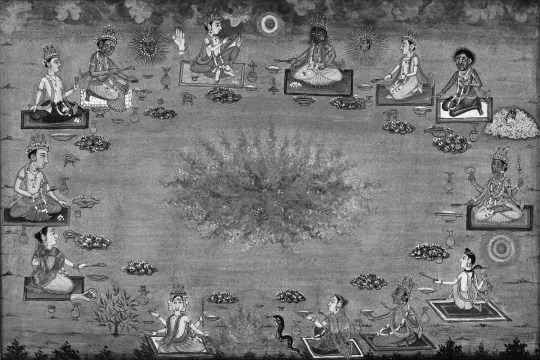
varuna (20000)
signs, degrees, houses, and aspects
question about varuna persona 4h sun, 12h uranus, 4h varuna, sun-varuna, uranus-varuna, and mc-varuna
what's a varuna persona?
varuna persona observations -> part 1 (coming soon)
vishnu (4034)
question about vishnu in pisces and virgo, 7h vishnu, and sun-vishnu aspects

like what you read? leave a tip and state what post it is for! please use my "suggest a post topic" button if you want to see a specific post or mythical asteroid next!
copyright terms
#astrology#astro community#astro placements#astro chart#asteroid astrology#asteroid#natal chart#persona chart#astrology tumblr#vedic astrology#vedic mythology#vedic astro notes#vedic astro observations#astrology chart#natal astrology#astrology readings#astro notes#varuna#vishnu#asteroid20000#asteroid4034
109 notes
·
View notes
Text
Explained : Strong Saturn & Weak Saturn
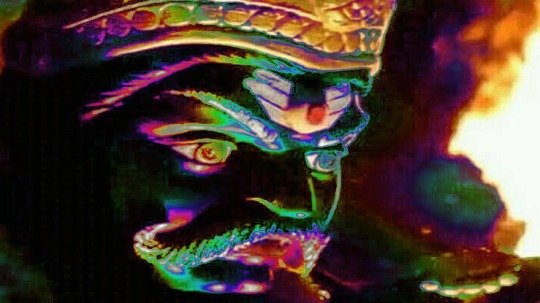
Saturn is harsh, but it will bring the best out of you !!
Let me tell you first what Saturn is?
Saturn is known for Quality.
Saturn is consistency.
Saturn is Maturity.
Saturn takes a long time before taking a decision.
Saturn has the ability to Command.
Saturn represents Longevity.
Saturn represents Service to Others.
Saturn represents Old age people.
Saturn represents servants and underprivileged people.
Saturn is unlucky or doesn’t favour those people who
Takes shortcuts.
Doesn’t deliver quality or are not consistent in their work.
Give controlling vibes to others.
Doesn’t respect old people and servants.
If you are not any one of these, it means that your Saturn is strong.
When Saturn is strong, a person doesn’t get short term success. That person is bound for success. It will be permanent and for long term.
To conclude, I will say that if Saturn is strong in someone’s birth chart, then that person nature is such that his/her passion is to face these difficulties bravely. They will not hide from it, rather they come out polished/refined from these difficulties. That’s why with these people, success is long term because qualities of winner are imbibed in them permanently due to hardships.
However, if your Saturn is weak, then as you mentioned in your question , these people will definitely face Saturn wrath of unluck/misfortune, hardships and sufferings.
Don’t try to cheat Saturn, it’s always looking at you.

#astrology#astro community#astro placements#vedic astrology#vedic chart#vedicknowledge#viralpost#vedic mythology#astro#zodiac#horoscope today#natal chart#peace#israel#aries#saturn#venus#astro observations#astro notes#synastry#astrology readings#viral trends#viralpage#viral#viralshorts#artists on tumblr#tumblr milestone
102 notes
·
View notes
Text

REVATI
Revati Nakshatra, the twenty-seventh and final constellation in Vedic astrology, symbolizes prosperity and abundance, depicted by a fish swimming in water. Linked with wealth, it suggests the ability to attain material success and financial stability. The myth of Revati and her father, King Kakudmi, contains the earliest known reference to time travel.
King Kakudmi, the ruler of Kusasthali, had a daughter named Revati. Seeking a suitable husband for her, they visited Lord Brahma, the creator of the universe. However, when they arrived, Brahma was listening to a musical performance in the celestial realm. Time in the heavens moved differently, and by the time Brahma turned his attention to Kakudmi's request, many ages had passed on Earth.
Brahma informed Kakudmi that all the kings suitable for Revati had died, as ages had passed on Earth while they were in the heavens. Upon returning to Earth, Kakudmi and Revati found that not only had the landscape changed, but also the social and cultural norms were vastly different from what they had known.
38 notes
·
View notes
Text
Saturn in various signs
Saturn's birth sign denotes characteristics that cause people to consider you seriously. You derive your authority from these characteristics. These characteristics cause people to worry that they won't meet up to your expectations. If you behave dishonestly, you will be held to the highest standards for these traits.
Try new things, stand up for what's vital, and defy all odds with Saturn in Aries. Others will imitate you because they are inspired by your courage.
Self-reliance, security, and resourcefulness are the hallmarks of Saturn in Taurus. Your unwavering, unwavering confidence in your position commands others to respect you.
Critical thinking abilities, language skills, and multitasking prowess are enhanced by Saturn in Gemini. New viewpoints on the world and yourself are all around you.
Saturn in Cancer represents the capacity to support and shield. You exhibit a sense of being a part of any nation, family, or humanity. Your family is frequently to blame for your success.
Saturn in Leo brings charm, confidence, and style. You inspire others by being positive, warm, and upbeat.
Saturn in Virgo represents the capacity to solve issues and carry out tasks successfully. You hold others accountable for their actions, guarantee their sincerity, and make moral arguments.
Saturn in Libra represents fairness, morality, balance, and the capacity to see both sides of an issue. Although Saturn is very powerful in your sign, the need to compromise and the urge to be in command of things collide.
Saturn in Scorpio is associated with charm, candour when discussing contentious issues, enormous riches, and authority. You can be a fearsome leader, a dangerous adversary, or occasionally both.
Civil rights, morality, and beliefs are all influenced by Saturn in Sagittarius. You encourage others to take a broader view of the world and their place in it.
Saturn in Capricorn: Hard choices, daunting responsibilities, demanding standards, resistance to self-pity. You motivate people to take on seemingly unattainable tasks.
Saturn in Aquarius: charm, nonconformity, and willingness to flout social norms. You inspire others to explore new worlds and develop fresh perspectives on established ones because to your remarkable personality and sense of flair.
Spirituality, personal pain, empathy for others, and creative genius are all aspects of Saturn in Pisces. You compel us to recognise our similarities in order to adopt a more sympathetic way of life.
#saturn#saturn transit#vedic astrology#Vedic Jyotish Online#vedic astro observations#vedicscience#astrology numerology vedicastrology#vedic mythology#astrology numerology vedicastrology#hindu vedic#Zodiac#horoscope#astrology#astro posts#astro placements#astro predictions#astro planets#predictive astrology#aries astrology#astro notes#vedic astro notes#astro observations#online kundali#Kundali#kundali matching
93 notes
·
View notes
Text

The main playable cast of my next game idea, dunno when I'll start working on it, but I have most of the plot already planned out.
-"Hroptr", an epithet of a certain Norse god.
-Dionysus, the god of rebirth and freedom.
-Vena, a god or sage mentioned in a single hymn of the Rigveda, his birth is blessed by many gods and he is described with multicolored rays of light.
Dionysus' design is based on Orphic fragment 258, describing a statue of Dionysus and equating him to the Sun, here below the cut.
‘Prepare all perfect things early morning, decking out
the body of the God, in imitation of the noble sun.
So first indeed like flaming rays,
encircle him in crimson, with a robe of fire.
Then over this, dangle a broad, many-colored faun-pelt,
spreading out the multi-spotted hide of the wild beast over the right shoulder
in imitation of the spangled stars and the divine axis of the sky.
Then over the faun’s pelt place a golden belt,
radiating, arrayed all ‘round his chest, a great sign!
...like Phaǽthôn (Φαέθων) leaping up straight from the rim of the earth
as he strikes the stream of Ôkæanós (Ὠκεανός) with his golden rays.
and there is an unspeakable gleam, mingled with the dew.
as he sparkles in whirls, winding ‘round in a circle,
before the God; then the belt beneath his immeasurable chest
looks like the ring of Ôkæanós, a great marvel to behold!’
#Greek Mythology#Norse Mythology#Vedic Mythology#Dionysus#Odin#Vena#Orphic Dionysus#Dionysus Zagreus#Orphism#Orphic Mysteries#Destiny of Dionysus#oc
11 notes
·
View notes
Text





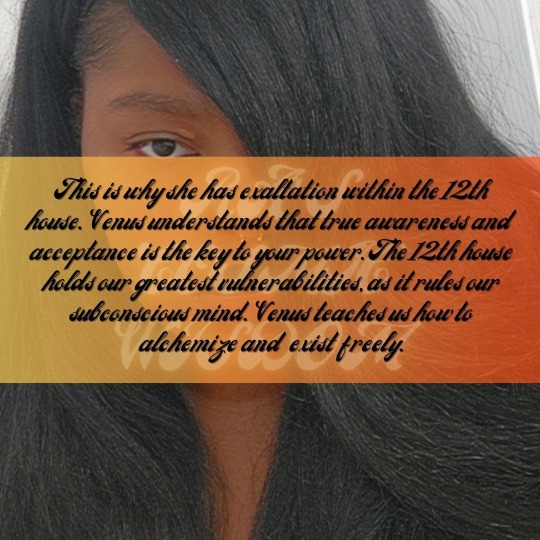

Shukra(Venus): Guru of Asuras
Venus is the planet of pleasure & satisfaction. She is the natural ruler of the 2nd house of money and values, and the 7th house of partnership and death. She rejoices in the 5th house of self expression. Venus is commonly seen for her beauty and bliss.
The essence of Venus is darkness as well. I do not say this with the connotation of “bad”, although there is much discomfort in creating harmony . All the houses Venus is connected to, there is desire and power, but there is also destruction and transformation.
The house Venus finds joy in is where we are often the most uncomfortable. The path of self expression does not always come easy . Self expression in the rawest forms isn’t the most pretty, it is often the opposite.
In the solar system Venus is the 2nd closest planet to the Sun. In astrology, her joy is found in the house that Sun is natural ruler of (5th). The 5th house is harmonious to the 9th house, where the Sun rejoices, Venus helps us reach enlightenment .
This is why she has exaltation within the 12th house. Venus understands that true awareness and acceptance is the key to your power. The 12th house holds our greatest vulnerabilities, as it rules our subconscious mind. Venus teaches us how to alchemize and exist freely.
Shukra is also a master of deception and illusion. Venus has its exaltation in the sign of Pisces, which can allude to fantasies and false realities. Venus desires to have control and can control its outer appearance through using awareness as a tool. Venus exalts im the 12th house also because of her ability to hide.
#astro notes#astrology#astrologer#astro observations#astrology community#vedic astro observations#vedic astro notes#vedic astrology#vedicknowledge#vedic culture#vedic literature#vedic mythology#vedic chart#venus in 12th house
17 notes
·
View notes
Text
What is love?
Radha not opening her eyes after birth to make sure that the first person she sees is krishn, yes, that's love.
Krishn falling for a woman who was cursed to forget him for several lifetimes, devoting himself to her...yes, that's love.
Radha being the only name that holds enough power to be written beside Krishn, krishn calling Radha with his own nickname "राधे", Radha loving krishn so much that she feels every pain of him, Krishn loving Radha with all his heart, knowing well that they're not destined to unite on this Earth & letting her go when the time came...
That's love.
#krishna#radhakrishna#gopiblr#radharani#vrindavan#kanhaiya#kanha#eternal love#hinduism#vedic mythology#bhagwad gita
18 notes
·
View notes
Text
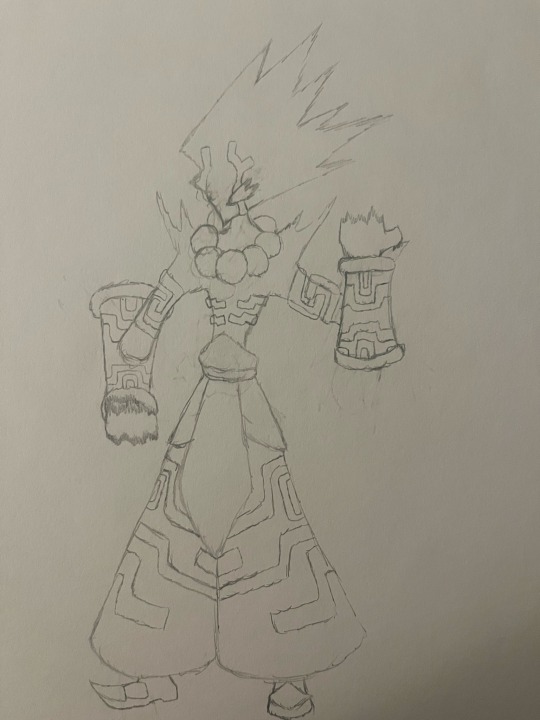
Indra, the Hindu god of lightning. In vedic mythology Indra was the king of the gods, considered to be the most influential among them. Born from the divine union between the skyfather Dyāus and the earthmother Prithvi, Indra’s rivalry with his father reached a fever pitch as when Indra learned of Dyāus assaulting his sister, Indra ripped Dyāus down from the skies and killed him in a righteous fury, ending the sky god. However the most famous of Indra’s rivalries was with the dark god Vritra. After Vritra stole and imprisoned all the water on earth, Indra confronted the serpent in battle. Their duel ended with Indra striking down Vritra.
Indra is one of the many examples of the Indo-European thunderer, overturning Varuna as the chief god. Much of Vedic mythology closely resembles Proto-indo-european myth, with Indra the thunderer, Dyāus the skyfather, and Prithvi the earthmother. However in modern Hinduism Indra’s position as the king of the devas has become less important with the oncoming of the trimutri. Despite this Indra still holds a significant place in the hearts of many Hindus as a great hero.
#art#character design#mythology#hinduism#vedic mythology#Deva#asura#indra#india#lightning god#deity#chief god#thunderer
7 notes
·
View notes
Note
hi! i know you made a post about magha placements but can you tell me a little more about specifically magha venus? i have mine in the 8th and was curious how this would play out. thank you in advance if you choose to answer :)
Magha Nakshatra: Pitri Secrets

the magha nakshatra (early leo) is ruled by:
planet- ketu
sacred animal- male rat
body part- nose, lips and chin
deity- pitris, forefathers of humanity
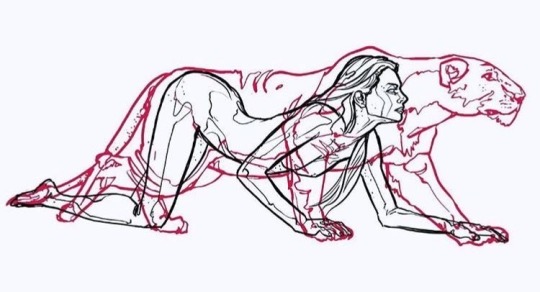
it is ruled by ketu, who is the guardian of our past karmas. wherever you have magha in your chart is where the past karmas are ripe enough to be experienced in this present life.
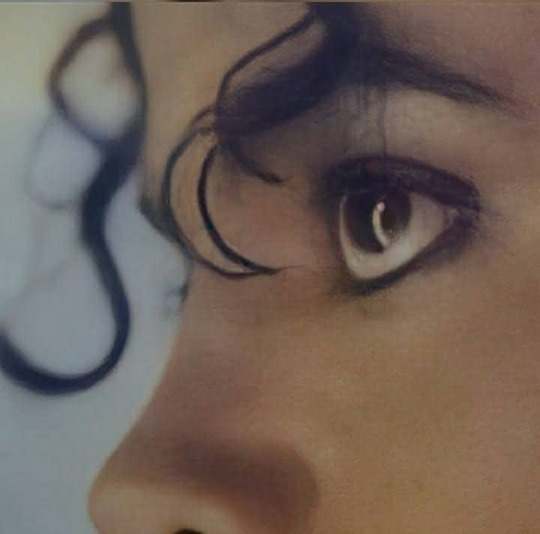
michael jackson- sun in magha
one thing i have noticed is that magha natives can easily become very class conscious. the symbol of magha is the throne, they seek attention and can also observe who is on “the top” of the pyramid and why they belong there. it’s a way for them to gauge what behaviors will help them eventually get on the top.
magha is the type of nakshatra that isn’t accompanied alone. usually magha natives have other indicators of karma, ancestry or forefathers in their chart like: sun conjunct saturn, any planets in 10th house, rahu/ketu in significant aspects, saturn conjunction moon, the magha planet in house 4/8/10, etc.
to completely understand your magha nakshatra, you must check where it’s ruling planet (ketu) is. for example- someone with magha mercury may have their ketu in the 12th house. this could mean they get their knowledge from their forefathers in the form of dreams, intuition, etc.

eva green, magha asc
magha venus can “attract” their ancestry very easily. venus is utter fulfillment and contentment in astrology, hence why you can attract easily using your venus. seeing that your venus is in the 8th house, you may uncover ancestral secrets or gain money through the property/riches of your forefathers. doing any sort of ancestral prayer/acknowledgement will help you understand intimacy and gain shared wealth.
magha mars may have a lot of karmic work to do regarding anger, drive and power. especially if it is conjunction/square saturn or sun. these are very fatherly, masculine planets. it can show wrongdoing of the ancestors on their male part, so now it’s someone’s time to change the tide.
generally, whatever house your magha is in- if you are facing difficulties in it, honoring your ancestors will help you.

uma thurman, magha asc

helena bonham carter, magha moon
How to Honor your Ancestors:
in general, any sort of acknowledgment to the ancestors can work.
in mahabharata, karna’s soul transcended to heaven where he was offered gold and jewels as food. he asked indra, the lord of heaven, the reason for serving gold as food.
karna had never donated food to his ancestors in shradha, since he was unaware of his ancestry. to make amends, he was given the opportunity to return to earth so that he can perform shraddha and donate food and water in their memory. this period is known as pitru paksha (fortnight of paternal ancestors).
amavasya (new moon) is a great time for magha natives as well.
doing shadow work related to your paternal ancestry / generational trauma helps you connect with yourself
reading about your genealogy, finding more about your ancestry
meditating, making art inspired from your ancestors, etc.
#astro#astro community#astro notes#astro observations#astrology#zodiac#zodiac signs#astrology notes#astrology observations#aries moon#leo moon#leo venus#leo mars#vedic mythology#vedic literature#vedic astro observations#vedic astrology#vedic astro notes#magha nakshatra#astroblr#astroloji#astro placements#vedic chart#vedic texts#ancestry#forefathers#leo mercury#vedic culture#hindu vedic#leo sun
232 notes
·
View notes
Text
Vedic Astrology Observations
Moon Dominant Men: “Deep and Mysterious”
🌖🌗🌘🌑🌒🌓🌔

(GIF context: Taken from Shadowhunters depicting a gay couple with Matt Daddario (left) who is Moon Dominant [Hasta sun and ketu with ketu as moon nakshatra ruler] and Harry Shum Jr. (right) who is Rahu Dominant [Ardra moon and Swati Jupiter with Sun in Jupiter ruled nakshatra]. Both actors identify as straight.)
In Vedic astrology, the Moon, or “Chandra”, occupies a position of profound significance. It is coveted as the very embodiment of the mind, a symbol resonant with clarity, reflection, instincts, and cycles, which when combined come to form what we know as perceptual consciousness. Like the Moon, which shines by reflecting the Sun's light, the mind similarly reflects its environment. It captures and reinterprets external stimuli, forming a consciousness that is, in essence, an image similar to that of a mirror of the surrounding world. In Vedic astrology, the Moon is a celestial body that stands as the fundamental indicator of one’s capacity for emotion and extends to one’s ability of cogitation, shaping the manner in which thoughts and emotions are processed and articulated. In contrast to Western philosophical perspectives, which tend to dichotomize emotions and logic, framing them as diametric to one another, Vedic astrology presents the Moon as a mediator that brings the two faculties together through upholding the position that our cognitive and decision-making processes are inextricably linked with emotional undercurrents. It echoes a sentiment that, even in endeavors that ostensibly try to prioritize objectivity, such as with epistemological pursuits, true objective knowledge is nothing but an elusive ideal. This stems from the notion that our perception forms our reality, encapsulated in the phrase, “I am my universe.” This is where the significance of the Moon in Vedic astrology becomes particularly relevant. It posits the idea that our subconscious greatly influences our conscious mind, thereby molding our individual perceptions of reality and shaping the way we experience the world. It recognizes the limitations in our control over our mental faculties and how emotions actively play a part in deciding our thoughts and life trajectories, whether we like it or not. This allows the symbolism of the Moon in Vedic astrology to effectively capture the human condition's amalgamation of thought and feeling, thereby speaking to the interaction of light and shadow in the psyche and the ongoing process of mental transformation.
Men with a pronounced lunar influence in their astrological charts, notably distinguished by those with primary placements (Sun, Moon, or Ascendant) in or aspects with Moon-ruled nakshatras such as Rohini, Hasta, and Shravana (planetary dominance can be determined in more subtle ways as well), present an intriguing study into the nuanced expressions of masculinity and relational dynamics. Examples of Public figures like Henry Cavill, with his Shravana Ascendant and Moon in the first house, or fictional characters like Flynn Ryder, voiced by an actor with a Hasta Sun and Rohini Moon, exemplify a unique blend of characteristics associated with lunar dominance that I will continue to explore further.
(GIF and image contexts: The first GIF shown depicts Henry Cavill as Clark Kent in Man of Steel. The second is an image showing the fictional character Flynn Ryder side by side with his voice actor Zachary Levi.)


The influence of the Moon on men can be understood through the influence of the mother and the lens of "Yin and Yang" in Eastern philosophy. In Vedic astrology, the Moon's connection with the mother can be said to link the development and characteristics of individuals to the amount of nurture and emotional sustenance they were provided with as a child. This nurturing shapes the robusticity of their intrinsic Yin qualities – receptivity, passivity, intuition, and a deep connection with the maternal aspects of life, often linked to the feminine. These qualities are further symbolized by the Moon and its cycles, traditionally associated with menstruation, highlighting the cyclical and nurturing features of femininity. In contrast, Yang represents the dynamic, assertive, and outward energy projection, typically linked to the masculine and more solar sattvic energies. Men with Moon-dominance in their astrological profiles embody this Yin energy, exemplifying a reflective masculinity and an inward understanding of femininity. This inward orientation of Yin, shaped significantly by the emotional and nurturing bond with mother figures, provides these men with a deeper understanding and connection to various feminine aspects of life. At the same time, the outward orientation of Yang allows for an external connection to the masculine, producing a self-identified masculinity that is introspective and emotionally/mentally attuned to the feminine while still being confident in its own nature. This ultimately does have a dampening effect on their exhibition of traditionally masculine behaviors, being that men as a whole are ruled by the Sun and are said to be more solar, while women as a whole are ruled by the Moon and are said to be more lunar. (The 24-hour circadian rhythm is based on the male hormone cycle and aligns with the Earth's orbit relative to the sun, while women have what is known as an infradian rhythm, which follows the 28-day lunar cycle, for reference). This internal emphasis on Yin but external reflection of Yang in Moon-dominant men's personalities makes them emotionally rich and empathetic, displaying a unique blend of masculine and feminine energies that is both introspective and in harmony with the external world. The Moon serves to harmonize the intense energy of the Sun, offering calming and nurturing attributes, ultimately leading to the formation of a kind of masculinity in these men that is fluid and can express strength in gentleness and assertiveness in sensitivity. However, this can also make them uniquely susceptible to certain challenges, which I will continue to discuss further in the following paragraphs.
The Moon is also tied with its nodes: Rahu and Ketu, the two mathematical points where the Moon's orbit meets the ecliptic (if you didn’t know, the Moon does not directly follow the ecliptic itself, which is the sun's path in the sky; it’s about 5° off approaching either node). The Moon's astrological significance is intricately linked to Rahu and Ketu, with all three governing distinct facets of consciousness. Rahu, often depicted as the head of a dragon or the head without a body, symbolizes material desires and is associated with the future, representing the qualities we need to develop and the experiences we must have to grow. Rahu is primarily concerned with the rational mind and the projection of consciousness into the material realm, epitomizing ambition, desire, and worldly aspirations. It represents the part of the psyche that is outwardly focused, engaging with the tangible aspects of life that are said to paradoxically represent the illusion of Maya. Conversely, Ketu, commonly depicted as the dragon’s tail or a headless body, represents detachment, spirituality, and the internal journey. It is associated with the past and karmic baggage, indicating the lessons we have learned and the experiences we must release to evolve through Samsara to achieve Moksha. Ketu is about letting go and achieving spiritual enlightenment. It is associated with intense spirituality, introspection, and the aspects of the psyche that delve into the depths of the subconscious and the ineffable. Ketu represents the part of the mind that seeks to understand and connect with the intangible, the mystical, and the existential. (In Vedic mythology, Rahu and Ketu are said to be the same demon killed by Vishnu)
The Moon acts as a mediating conduit between these two nodes, attempting to balance the rational, materialistic impulses of Rahu with the spiritual, introspective tendencies of Ketu. It symbolizes the emotional and perceptual aspects of consciousness, playing a supreme role in how feelings and intuition are integrated with rational thought and spiritual insight. The Moon's position in a chart thus reflects the ongoing dance between the material and spiritual dimensions of human existence, influencing how individuals perceive and interact with the world around them. And because the moon works with the energy of both nodes, we can gain knowledge into the expression of Moon-dominant individuals by looking at aspects of Rahu-dominant and Ketu-dominant natives.
Rahu-dominant men often exhibit a desire for control, particularly in their mental environments. Their creativity often manifests in unique, sometimes eccentric ways, setting them apart in their expression and thought processes. These individuals typically lean towards liberal ideologies, embracing progressive and forward-thinking concepts but is often against society as a whole. Rahu-dominant men are often driven by ambition and a desire to achieve success and recognition. They are inclined to be more outwardly assertive in their quest for control, sometimes pursuing their goals with a relentless, almost aggressive, determination. This pursuit often leads them to challenge established norms and push boundaries, both socially and professionally. And while Moon-dominant men share traits with Rahu-dominant men, they exhibit distinct differences in how these characteristics are expressed and integrated into their personalities. Moon-dominant men tend to internalize their need for control, focusing more on emotional and psychological self-mastery. They are more concerned with understanding and regulating emotions rather than exerting control over external circumstances for the sake of gaining power, and they are more satiated with what they have rather than desiring what they don't, making them less materially-orirented than Rahu. Rahu men often have an obsession with external appearances and how others perceive them, trying to enforce their own rules or standards on others in order to gain the upper hand, but Moon men just want to maintain their own sense of security. They may still try to subtly reshape situations though, not to become the dominant power, but as a means to maintain their personal well-being, even at times to the detriment to others. Additionally, their approach to creativity is more reflective and introspective than what you might expect to see from Rahu, often drawing from deep emotional reservoirs and personal memories. Moon-dominant men may too challenge conventional thinking like Rahu dominant men, but their methods are typically more subtle and under the radar. For example, if a Moon-dominant man wants to avoid an arranged marriage, he might subtly express concerns or sadness about the marriage in a manner that is meant to gently persuade his family to rethink their decision. Simultaneously, he might engage in covert actions to disrupt the arrangement, such as discreetly creating scheduling conflicts and other minor obstacles that prevent it from happening efficiently as if to send unconscious signals that it was not "meant to be." In more extreme instances, he may feign agreement, choosing instead to engage in extramarital affairs, all while maintaining a cloak of compliance to avoid direct confrontation. This is in stark contrast to a Rahu man who will openly question and criticize the tradition, speaking out against his family to say it is stupid, and he may even actively rebel against it by running away to marry someone else.
(Add-on: both Rahu and Moon men possess an acute awareness of the perils of straying too far from rationality and thus are inclined to maintain a strong connection with external reality. They may encounter challenges when they engage too much with the immaterial, like dreaming, drugs, alcohol, gambling, etc., leading to their connection with external reality becoming tenuous. This disconnection can lead to issues such as escapism, addiction, and emotional disturbances, so be wary and try not to get to the point of obsession where you lose sight of your life.)
Conversely, Ketu-dominant men often possess a deep internal focus and an inclination towards introspection. Ketu-dominant men are often characterized by their profound spiritual orientation and a tendency towards seeking inner peace and enlightenment. They may exhibit a strong interest in the metaphysical or the mystical, delving into areas that transcend the material world. This spiritual pursuit often leads them to detach from worldly ambitions and superficial desires, making them appear aloof or disinterested in material success, paradoxically leading them to attract immense power. They tend to absorb energy from their surroundings, revealing truths in impactful ways and arousing servitude in others due to their stilled, void-like nature that makes people want to give to these men tirelessly. Ketu-dominant men might display a more pronounced detachment from their emotions. While they are capable of deep feeling, they often approach their emotions from a place of observation and analysis, rather than immersion. This detachment can sometimes be misinterpreted as coldness or indifference, but it is more accurately a sign of their deep internal processing and preference for solitude. Moon-dominant men, while sharing certain introspective and internal qualities with Ketu-dominant individuals, exhibit these traits in distinctly different ways, shaped by the unique lunar influence. while Moon-dominant individuals also exhibit introspection and depth, their focus is more on the emotional and psychological features. They are keenly attuned to the nuances of their own emotions as well as those of others, and this emotional sensitivity often translates into a strong sense of empathy and an intuitive understanding of human nature. Unlike the Ketu-dominant detachment, Moon-dominant men are more engaged with their immediate environment, forming deep emotional connections and valuing interpersonal relationships more than Ketu men (note that this also depends on the placement of moon in the chart as a whole, like 12 house Moon in Jyeshtha will be more Ketu-like for example). Moreover, Moon-dominant individuals may exhibit a fluctuating nature, akin to the waxing and waning phases of the Moon. They can be adaptable and receptive, often reflecting the energies around them, which can lead to a rich, albeit sometimes confusing, emotional life. This contrasts with the more consistent, inward-focused nature of Ketu-dominant men, who may remain unfazed by external circumstances, steadfast in their introspective approach for better or worse. People are drawn to both Moon and Ketu dominant men due to their compelling allure of hiddenness, but unlike the Ketu man that will remain still and almost hollow, absorbing all of the energy and power they come in contact with through their tamasic nature, Moon men will reflect energy back. This reflection of energy, softer and more reciprocal, differentiates Moon-dominant men from their Ketu-dominant counterparts, in the way that it doesn’t illicit as much discomfort in others. What usually happens with Ketu men is that others sense their inherent “emptiness,” which causes them dis-ease to the point where they will shower these men with energy in hopes that doing so will change the Ketu man or stabilize him. But Ketu men don’t work like that; their purpose is to take and consume, so no matter how much energy people give them, it is never going to be enough to make that penetrating uneasiness they give off go away. This isn’t a bad thing though. In fact, it is beneficial to the energies whose purpose it is to give, like Jupiter. It just comes down to the role people are meant to serve in this life. The differences between Moon and Ketu men highlight the unique ways in which they connect with and respond to the world around them as it relates to their Dharma.
Connecting Rahu and Ketu, because of the Moon’s relationship with both of these astrological energies, Moon-dominant natives will not only resonate with the powerful spiritual and subconscious layers of Ketu, but also to the more tangible, worldly, and reasoned aspirations represented by Rahu. This connection with Rahu and Ketu instills Moon-dominant men with a magnetic charm, characteristic of Ketu men, that is less domineering and still grounded in the more rational world of Rahu, making their allure more accessible and relatable to others. Unlike the piercing, sometimes overwhelming and obsessive depth of Ketu and the overbearing frigidity and judgments associated with Rahu, the Moon's influence results in more of a balanced persuasive appeal, empowering them with an immensely vitalizing aura. Overall, while there is a resemblance between the effects of Rahu/Ketu and the Moon, the way they manifest and are perceived is distinct. I think it bears mentioning that since the Moon deals with the energies of both, its natives are also susceptible to accompanying pitfalls for either. Because despite their inter-relation, the Moon’s integration of these energies can be messy. Rahu and Ketu are the extremes, which can end up eclipsing the Moon and/or the Sun, “swallowing” their energies (light) to try and destroy them. This solidifies the nodes’ place as natural adversaries of the luminaries.
(Add-on: There’s a balance that must be struck when dealing with these energies, and sometimes they can just be too difficult to manage, leading to things like insanity. While the Moon, Rahu, and Ketu are similar, it is important to remember the differences, with the main takeaway being to exercise awareness and moderation, as these energies can be seriously harmful when experienced in excess. Intriguingly, individuals under the influence of the Moon, Rahu, or Ketu bodies often show the most fascination with understanding psychology, perhaps drawn to explore the very forces that make them uniquely susceptible to emotional and mental turbulence. And oh… isn’t that poetic?)
Alright, now let’s get into the juice of things. As alluded to before, men whose astrological charts are heavily influenced by the moon have the ability to understand emotions and empathize deeply with the feelings of those around them, allowing them to form powerful connections within their relationships. Their insight into the human mind and “heart,” much like the Moon's light that gently illuminates the night, shines on the more hidden aspects of those they interact with. They are known for their exceptional depth of emotional acuity as well as having an intuitive grasp of mental states, including their own. This is typically not overt, however, since there is a concealed nature to the Moon, being traditionally associated with obscurity and subtle aspects of the human psyche. In addition to this, since men perceived as being outwardly feminine have historically been subjects of abuse and harsh treatment from society, Moon-dominant men are more inclined to sheath the less hardened parts of themselves for fear of social scorn. This is important to keep in mind, since Shravana is the most refined and mature expression of the Moon.
Symbolized by an ear, this nakshatra signifies listening, learning, and connection. It is associated with the acquisition of knowledge and the understanding of the world. Men influenced by Shravana may possess a strong inclination towards gathering information, being attentive listeners, and showing a deep interest in the narratives and experiences of others. This attentive and perceptive nature is a personification of the Moon's influence, producing qualities like empathy and understanding, which can be seen as more feminine in nature. Being in Capricorn (the natural ruler of house ten: career and reputation), it is also deeply entwined with themes of reputation and public perception in addition to control. This comes into focus when we consider how Vishnu, the Deity ruling over Shravana for men, is the preserver, suggesting a proclivity of these men to maintain their public reputations and personas through discipline (Saturn deals with control and discipline and is the ruler of Capricorn, for reference). Interestingly, I’ve noticed that Rohini and Hasta men tend to be more openly receptive than Shravana. Hasta is a nakshatra that is linked with dexterity and skill, symbolized by a hand, and more specifically with the ability to manifest one’s desires into the hand. The influence of its ruling deity Savitar, an incarnation of the Sun (contradictory, I know), gives Hasta characteristics of vigor, intelligence, and the ability to dispel ignorance. However, this solar influence is juxtaposed with the Moon's governance over Hasta, which brings in a more calculative desire for energy exchange through things like conversations, meetings, sex, negotiations, fighting, etc., which is not carried out in quite the same way as Sun-dominant men, being that the Moon introduces a more emotionally intelligent approach to these interactions. While the Sun's influence might drive a person towards externally focused actions where they expend energy carelessly, the Moon's guidance in Hasta gives a deeper sensitivity and awareness in their engagements. This means that their approach to energy exchanges, whether in professional settings, personal relationships, or even in conflict, tends to be more reflective and considerate of the emotional context. Men influenced by Hasta may exhibit a strong, vibrant persona, often marked by a commanding yet undeniably soft presence (I’ll reference him again, but the best example of this I could find is Leonardo DiCaprio who is Hasta Moon and Ascendant). Rohini, the first nakshatra under the dominion of the Moon and co-ruled by Venus in Taurus, is emblematic of the chariot, an ancient symbol related with themes of progress, movement, and evolution. This nakshatra's associations with growth, creation, and fertility find their roots in the nurturing energies of the Moon, where it is in exaltation, and the artistic, sensual qualities of Venus. The deity overseeing Rohini, Brahma, is revered as the creator in the Hindu pantheon, further intensifying the nakshatra's intrinsic connection to creativity, nurture, the enjoyment of creation, and the genesis of life. Rohini men often exude natural charm, emphasized by a creative and nurturing disposition. These qualities, resonating with the creative and generative aspects of Brahma, can be seen as more feminine in nature. However, due to societal pressures to adhere to traditional masculine norms, Rohini men might feel compelled to mask these traits. The pressure to conform to traditional masculine norms might lead Rohini men to stifle or conceal these aspects of their personalities, as I've come to acknowledge can be a facet of all Moon men.
The Moon's dominance in a man's chart can influence his expression of gender and identity, modulated by whether he is accepting of his femininity, as observed in public figures like David Bowie (Shravana asc. and Rohini rahu), Prince (Rohini sun and mercury), Troye Sivan (Rohini sun and mercury), etc. These men, embracing their lunar qualities, often work to defy traditional gender norms, adopting androgynous styles that symbolize the fluidity of their gender identity. Their choices in fashion - long, flowing hairstyles, delicate fabrics, and makeup or nail polish - are external manifestations of their inner lunar essence. Some even go as far as dressing up like women! It is not done in a castigating manner where they make fun of the idea as a form of humiliation either; rather, it is more of an attempt to make a full embrace of what it would be like to genuinely exist as a woman, albeit a tad bit over-exaggerated in terms of femininity, but to be fair, that’s the same for Moon-dominant women as well. (This is a bit of a tangent, so skip if you aren't interested. Interestingly I think these men’s personas of women are closer to Ashlesha [in cancer rashi ruled by moon but nakshatra ruler Mercury] than of Moon nakshatra women, possibly being a result of these men having so much pent up female sexuality that yearns to be dominated in much the same way as Ashlesha women, who act outwardly dominant to test the virality of others – beckoning to be overpowered. I noticed this in the new movie Expendables, which stars Jason Statham and Megan Fox (Ashlesha moon). In one scene, they are fighting and Megan Fox comes out on top before again being overpowered, demonstrating that the man is virile enough to "have"/contain/satisfy her. And then she redirects his penetrative energy yet again, which is a common theme of Ashlesha. The "cutesy" fake innocence at the beginning is also something Ashlesha women are known for.)
(GIF context: It shows Troye Sivan dressed in drag for his latest music video and song "One of Your Girls". He is also openly gay and for the time being has not declared he is trans, nonbinary, etc. For fun, you can compare that with this music video with Megan Fox, who is an Ashlesha woman to see what I mean when I compare them: video.)

However, most Moon-dominant men are not as comfortable expressing this duality so openly. Many, in response to societal pressures that valorize hyper-masculine traits and often stigmatize femininity in men, adopt a façade of heightened contentment, stoicism, and control. This outward show, mirroring the characteristics of Sun and Saturn-dominant men, is an attempt to conceal their innate Yin nature. Yet, akin to the Moon which only reflects the Sun's light in a softer, cooler manner, their portrayal of hyper-masculine traits is not pure or without cracks. People can still very much pick up on their the fact that they are simply reflecting masculinity while still internally housing receptive feminine energies, since they reveal themselves in small but noticeable ways that make them stand out from other men. They usually carry with them an undercurrent of mystery, farce, and a general tendency to be overly, and dare I say even comically, brutish, while their emotionally expressive nature still peeks through. This divergence from the archetype they emulate within imparts an illusory, intriguing energy to their persona, attracting some while aggravating others who are less willing to accept the illusion. The struggle to mask their true nature often leads to complex interpretations of these men. It reflects the multifaceted nature of the Moon, continuously oscillating between visibility and concealment, constantly changing from clarity to mystery. This theater play of lunar influence in their lives makes these men seem as though they are impossible to understand fully, impressing, confusing, perplexing, and captivating all who come across them.
Celebrities like Theo James (Hasta moon and Shravana venus), Christian Bale (Shravana sun), Noah Centineo (Shravana moon and ketu), Joe Jonas (Shravana moon and Hasta asc.), etc. find their sexuality and morality subject to speculation and even denial by the general public. This scrutiny mimics the way women are often doubted and judged, suggesting a societal judgement of the feminine nature. The public's perception and scrutiny of the sexuality and morality of these men often reaches a point where rumors and allegations, ranging from them secretly being gay or abusive, become rampant. This perceived incongruence between their public persona and private self can trigger a sense of being "lied to" in observers, leading to a backlash or a desire to uncover the 'truth' about these men. The Moon's influence, thus, extends beyond the individual to affect public perceptions and reactions in this way. This phenomenon also offers insight into why Moon-dominant male celebrities (in addition to Rahu and Ketu-dominant men, I’ve noticed) often find themselves cast in roles as gay characters, even while being openly straight, such as in the case of Jake Gyllenhaal (Rohini moon, Hasta jupiter and saturn, and Shravana ketu [his second dominant]) in "Brokeback Mountain,” Harry Styles (Hasta moon & Shravana sun and venus) in “My Policeman,” Ewan Mcgregor (Hasta asc. and cancer rashi ketu in Ashlesha) in “The Pillow Book,” Nick Robinson (Hasta sun) in “Love, Simon,” the examples I gave in the caption at the very beginning for Shadowhunter, etc.
(GIF contexts: The first GIF shows Theo James in the TV series "Sanditon" as Sidney Parker giving a cheekish smile. The second shows Harry Styles in "My Policeman" getting his neck kissed by his male lover while he smiles with enjoyment.)


The Moon's association with fluidity, hidden depths, and possessing understanding of emotions and identity makes these actors particularly adept at portraying complex, non-traditional roles (they are great at portraying emotions at all levels of intensity in general, with a prime example being Leonardo DiCaprio [Hasta moon and Asc. moon in 1st house]), who is known to be a phenomenal actor, almost shapeshifting into whatever a movie expects of him and displaying deep, powerful emotions). However, that being the case, Ketu and Rahu might still be more prominent when it comes to this trope of casting straight men to play gay roles, possibly due to homosexuality often being seen merely as the act of having sex with other men, rather than an intimately personal aspect of identity that has an impact on all areas of an individual’s life. This has the effect of reducing gay characters to straight men more willing to engage with ideas seen as non-conventional or morally perverse (more commonly associated with Rahu and Ketu), while still maintaining their straight charm that appeals to mainstream audiences. It is easier to depict gay men as "devouring" or Ketu-like, as seen in associations with Mula Nakshatra, which is related to the act of excretion from the anus, but this narrow depiction overlooks the complexity of sexual orientation, reducing it to pure physicality of external behavior. It fails to acknowledge that being gay encompasses a broad array of emotions, experiences, and identities far beyond superficial characteristics. Moon-dominant mens’ ability to resonate with and express a wide spectrum of human experiences, including those that challenge conventional norms, is enhanced by their lunar characteristics, but these themes might also be more prone to attracting false representation due to widespread misunderstandings. I’d also like to make it known that I am aware that there are many gay and bi Moon, Rahu, and Ketu-dominant men as well; they just aren’t nearly as common and hardly, if ever, get casted in the kind of deeper gay roles I'm referring to.
Continuing this exploration, it's evident that the very qualities that lend Moon-dominant men their depth, intrigue, and warmth can also lead to significant challenges. The Moon's inherent receptivity endows these individuals with a remarkable adaptability, which, while often a strength, can manifest in less positive avenues. Their exceptional ability to influence perceptions and beliefs, a direct result of their emotional responsiveness and innate understanding of the mind's energies, can become problematic. In certain circumstances, this lunar influence may veer into darker territories with one major potential downside in particular being emotional manipulation, where their intuitive grasp of human emotions can be misused for personal gain or to sway others unduly. Their innate power over emotion and human psychology can lead them to engage in behaviors such as lying, espionage, cheating/betrayal, infidelity, illegal clandestine activities, and exploitation. The Moon's association with hidden aspects and the subconscious mind makes its natives highly skilled at navigating these activities, sometimes even leading them into antisocial or unethical paths, which can be seen in many different media portrayals I’ll cover later on. But for now, I will point to the personal life example of Ryan Philippe (Shravana asc. & Hasta mercury), who is notorious for his multiple instances of cheating on his wife and other subsequent partners, in addition to a history of drug misuse and allegations of domestic violence. An important thing to note when I speak about these things, however, is that while they can be masters of manipulation, Moon-nakshatra men do not possess complete control over the mind to the point where they always get people to do anything they want. Similar to the Moon relying on the Sun's light, their "power" actually depends on people willing to project onto and exchange energy with them, which can make Moon-dominant men extremely vulnerable, even more so than Moon women (people will instinctually try to defend moon women because they perceive them as being pure and innocent, unable to protect themselves; the same sentiment is not afforded to Moon men, who people think should be able to defend themselves with their physical power). In fact, Moon-dominant men often struggle to set boundaries due to a fear of direct confrontation as well as a desire to be what other people want of them, often worshipping the people they are closest to (they really want respect and attention from others and will endure harsh treatment or act untoward if it means getting that from someone they respect themselves, sometimes to an unhealthy extreme). That brings me to my next point of abuse... Whether inflicted or incurred, abuse (especially relating to domesticity and women) is another shadowy aspect of the Moon's influence in Vedic astrology, aligning with many of the experiences of Moon-dominant men in media and in real life. The frequent association of moon-dominant men with themes of abuse in media – be it as perpetrators, victims, or both – intertwines notions of vulnerability and aggression, showing the darker side that emotions can take, and subsequently, the darker side humanity can take as well. Overall, it makes sense why people often connect Moon men to ideas of abuse in media and in real life, such as with Evan Peters (Hasta moon and Shravana mercury) in “American Horror Story—Coven” where he was sexually abused by his mother (among other things; that show put him through it...), Christian Bale (Shravana sun) in American Psycho being abusive towards women, Tom Hardy (Hasta moon and Rahu) in “Peaky Blinders” being extremely violent and hedonistic, etc.
(Add-on: This is a bit of sensitive topic related to sexualization, so discretion is advised. Just as women traditionally face sexual objectification, Moon-dominant men may also encounter similar treatment due to their inherent passivity and receptive nature, leading to sexualization and other forms of scrutiny that stem from societal tendencies to view individuals who are more passive and receptive as feminine as being more accessible to take advantage of. This sexualization, particularly prevalent in the portrayal of these men in scenes of nudity [I've yet to find a Moon-dominant male actor who has not done a nude scene, even though many speak about how they did not want to do it at the time and felt uncomfortable] or in the adult film industry (an industry known for its connections with abuse) where I've found Moon men to be most over-represented in terms of planetary dominance, showcases a societal inclination to exploit those exhibiting traits diverging from traditional assertiveness.)
(GIF contexts: The first GIF shows Evan Peters in American Horror Story Crying. The second GIF is of Tom Hardy in Peaky Blinders smoking.)


In the film industry, the energies of Moon-dominant men, characterized by their complex emotions, adaptability, and concealed depths, are astutely recognized by directors. This insight informs casting decisions, often placing Moon-dominant actors in roles that mirror the multifaceted nature inherent in them. Christian Bale's (Shravana sun) portrayal of Jim Luther in "Harsh Times" exemplifies this, exploring the darker recesses of the human psyche, a reflection of the Moon's association with concealed motives and intricate emotional situations. Similarly, Denzel Washington's (Shravana moon, Hasta asc.) performances in "American Gangster" and "Training Day" depict a tough exterior masking a softer core, Michele Morrone (Hasta sun & venus and Shravana rahu) in "365 Days" intertwines criminal elements with deep emotional entanglement, and Tom Hiddleston's (this one is super interesting because, while he doesn't have any primary moon placements, he does have Hasta jupiter & saturn— the moon nakshatra ruler and subruler of his chart plus Shravana Venus and ketu, so I consider him moon-dominant) Loki across Marvel films embodies cunning coupled with hidden vulnerability. Matt Daddario (see top of post) and Matt Bomer (Hasta moon, mercury, and rahu), in "Shadowhunters" and "White Collar" respectively, delve into the realms of a secret society of demon hunting & then crime/subterfuge with personal attachments to it, personifying the Moon's nature.
(GIF contexts: The first GIF shows Michele Morrone in 365 days shirtless and talking while looking down. The second GIF is taken from White Collar showing Matt Bomer talking frantically.)


Zachary Levi as Flynn Ryder personifies this duality - mischievous yet sensitive, conniving yet protective, masculine yet feminine, seeking introspective depth yet maintaining material asperations, and so on. Followed by Henry Cavill's roles, particularly Superman and Geralt, further illustrate this theme of his invincible, hyper-masculine superhero persona of Superman veiling the sensitive, complex nature of Clark Kent that he must keep hidden through great discipline (The original actor for Superman Kirk Alyn was also moon dominant (Hasta sun and mars with a lot of his chart's energy tracing back to sun). One the other hand, Christoper Reeve– arguably one of the most popular actors to play Superman– has his Sun and Mercury less than one degree away from being in Hasta, but overall, his chart is still Sun-dominated with a lot of Uttara Phalguni and Krikita, which makes sense because one: it was old hollywood, and two: the reason people love him is for his portrayal as the hyper-masculine persona of Superman, which would have been closer to Reeve's true nature anyway. In my opinion, his portrayal as Clark Kent is kind of bad because he treats that like it is supposed to be his geeky alter-ego rather than the fact that he would have been raised as Clark Kent– the humble farm boy from Kansas, not as Superman. Anyway, rant over). And Geralt, who presents a facade of absolute masculine strength defeating monsters for a living and projecting a sense of detachment from others, all while concealing a deeper, more nurturing and intimate side of himself. These portrayals, necessitating depth and often grappling with themes of manipulation and other complex moral dynamics, go hand-in-hand with the Moon's influence on hidden emotional strata and ethical complexities. The performances of these actors align with the experiences of many Moon-dominant men, reflecting the nature of their personalities. (Thank you so much to anyone who read this entire thing! 🙂 I know it’s a ton of information to get through, so I do really appreciate any time and effort people put into reading this!)
#vedic astrology#astrology#astrology observations#nakshatras#zodiac#astro community#astro notes#astro observations#zodiac signs#astrology notes#vedic chart#vedic astro observations#vedic astro notes#vedic texts#vedic mythology#lagna#astro placements#astroblr#sidereal astrology#capricorn#virgo#taurus#moon men#moon-dominant men
136 notes
·
View notes
Text

And they were roommates-
#mythology memes#incorrect mythology#hindu mythology#hindu myths#hindu gods#agni#agni x soma#agni-soma#hindublr#desiblr#hindu memes#vedic mythology#vedic literature#vedic culture#desi tumblr#desi tag#desiposting#hinduism
64 notes
·
View notes
Note
hi i really wonder your think about varuna(20000) conjunct sun at 1 orb, both(varuna and sun)3h cancer in varuna pc chart. Someone says varuna conjunct sun in varuna pc chart is fame indicator. I read your varuna-sun posting but i wanna know other things. Could you tell some your opinion?
thanks:)
what's a varuna (asteroid 20000) persona? what can a varuna persona chart show you?
your varuna chart can help you to understand control that you seek, how you can lose power, if you'll be forced out of any situations in life, why and how you strive for balance, why you prioritize morals, and/or what morals you have.
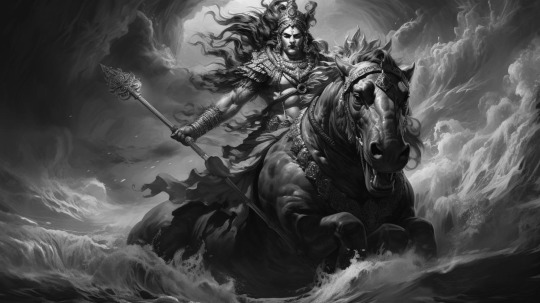
sun
why you feel like you must be in control, power, vitality, attention you receive for being in charge and keeping everything together, where you have to think creatively to better time manage, the authority you hold to change a situation, how you think you are invaluable, morals surrounding giving, how you develop morally, moral dignity, moral consciousness, and/or and creative activities that make you happy
moon
control you have over your emotions / emotional responses, instincts to maintain homeostasis in emotional situations, how you care for others despite the power (or lack thereof) you have, how you create a comfort zone via control, how you balance femininity, how controlling you maternal figure is/was, control you had or did not have at a young age, how you adapt despite feeling the urge to seek control, controlling/obsessive habits you may have, and/or comfort you find in consistency
mercury
how you moderate via communication, the control you have over your thoughts, the control you have over your health, perception of morality, a fall from social media or control you have over your online persona, the control you have over your mannerisms, gestures you make in order to keep peace, reason, and/or how you control gossip about you
venus
control over love, equality you show when in partnership, control you have over your romantic situation, how you manage/control beauty, morality that guides your sympathy, harmony you seek in the world around you, how you compromise, and/or the values you have
mars
control you have over your desires, confidence you have in your station, ambition to maintain power and balance, impulse control, how self-assured you are of your station in life, how you assert your control/dominance, physical energy expend to keep balance in the world, friction with the universe, and/or moral motives
jupiter
luck in maintaining power, abundance of control/power you hold, success you have when controlling things and maintaining balance, expansion of your empire, knowledge you use to maintain power/control/balance, knowledge of morals, morality surrounding honesty, how wisdom provides you balance and peace, exploration of morality, in the world and universe faith, and/or karmic fulfillment
saturn
where you work hard to maintain balance, what you work hard to balance, where your power is challenged, how your power is challenged, where you struggle to find balance/control, fear of losing power, delayed downfall, limitations of power/control, discipline you have to maintain balance, effort you exert to maintain balance, self-control, stability you create, and/or endurance
uranus
control you have of a group of people, how you control technology, unplanned/sudden retirement or loss of power, how you attempt to control ups and downs, rebellion that seeks balance, freedom you facilitate that brings peace, and/or how your fans/followers might feel controlled by you and or how you might lose your popular opinion
neptune
how you use kindness/compassion to maintain balance, illusion of control you have, selflessly controlling things, how you intuitively balance the world around you, hidden intentions, how you imagine peace would be, how you feel about deception/lies morally, moral confusion, disappearance, what inspires balance, moral transcendence, fascination with control, and/or moral idealism
pluto
how being controlling changes you, power you have, destruction (ending in renewal), moral change, how you control intimacy, magnetism you have that makes you worthy of being listened to, obsession with control/balance, how you use seduction to control/manipulate, and/or how you morally evolve
varuna
where you are controlled, how you are controlled, where you are a disgrace, where you feel weak, why you feel weak, balance you have in life naturally, and/or morality
1h
how you identity with power, leadership traits, moral approach in life, appearing controlling, control over the physical body, how you take initiative, outwardly controlling behavior, how you maintain peace, and/or moral individuality
2h
control of money/finances, moderate spending, how worthy you feel of power, your values, stability you seek, how you balance giving/receiving, and/or control of resources
3h
control you have when speaking, control you have over your mind, power of your opinions, control you have over your conscious mind, moral interests, how you control ideas/information, how control social activity, and/or how you balance socializing and responsibility
4h
control/power you possess at homes, control possessed by family/parents (particularly matriarchs), how you balance the care of inner child with maturity/security, controls over your emotions, control over your own childhood, and/or how you balance femininity
5h
moral talents, loss of talent, creative control, drama, enjoyment of power, romantic dominance/control, pleasure found in moderation, and/or moral speculation
6h
control over your daily routine, control you have over your health/body, how you manage your duties, control over your self-improvement, consistency of your character, systems of power, and/or moral service to others
7h
control of a marriage/partnership, how you manage your concern for others, how you attempt to control attraction, how you control conflict, moral negotiations/reasonings, balance/equality, and/or moral harmony
8h
moral transformation, change in power status, longevity of your power/control, control over your investments, how you control seduction/intimacy, control of assets, and/or control of secrets
9h
moral wisdom, how you manage beliefs, moral philosophy, moral viewpoints, moral ethics, learning about morals, and/or moderation
10h
control over your legacy, retirement from your career, control over your public image, power your status, moral responsibilities, and/or how you balance all your responsibilities authority
11h
how you control friends/groups, moral gains, how you control desires, how you balance social awareness, control over your influence of others, control of manifestations, moral ideals, and/or how you control social interaction
12h
power/control over healing, control over mental health, balancing your solitude/isolation, power of spirituality, control over your fears, how you manage loss/endings, how you manage socializing with isolation, limitations of moral belief, and/or control of subconscious mind

like what you read? leave a tip and state what post it is for! please use my "suggest a post topic" button if you want to see a specific post or mythical asteroid next!
click here for the masterlist
click here for more vedic myths & legends
want a personal reading? click here to check out my reading options and prices!
© a-d-nox 2024 all rights reserved
#astrology#astro community#astro placements#astro chart#asteroid astrology#asteroid#natal chart#persona chart#astrology tumblr#astrology chart#natal astrology#astrology readings#astro notes#astro observations#astroblr#astrology blog#vedic astrology#vedic mythology#vedic chart#vedic astro notes#varuna#varuna persona chart#asteroid20000
51 notes
·
View notes
Text
Astrological Alchemy: The Planetary Puzzle of Superhuman Intelligence
The Answer is Ketu which is the most intelligent planet among all according as my studies.

Well, Shakuntala Devi was an Indian mental calculator and writer, popularly known as the "Human Computer". Her talent earned her a place in the 1982 edition of The Guinness Book of World Records. In her birth chart, Ketu is sitting with Mercury, Sun and Mars.

What is Ketu basically?
Ketu is past life.
Ketu is boredom.
Ketu is detachment.
Ketu is experience.
Ketu represents nothingness.
Ketu represents psychology.
Ketu can feel things without watching anything.
This means that when you have experienced the knowledge of any skill fully in your past life, you can do wonders in this life with the help of that knowledge.
Because nobody knows better than you in that field than you know it.Ketu also never runs behind anything that's why things come to a person easily with Ketu conjunctions or aspects.
How can we see what skills we have already experienced in our past life-
If Ketu sits or aspects Moon-These people have gone through lot of mental torture in past life. Now in present life, these people have learned to make their mind(Moon) stronger than anyone else.
If Ketu sits with or aspects Sun- In their previous life ,these people were trapped in such situations that they were not allowed to take a single decision regarding their life or other person's life. Due to taking away all their powers of authority in previous life, now in present life, these people finally realized to surrender to the superpower(universe) and understood the fact that no 🍃 leaf can move without the permission of Superpower(Universe). This let them win over their ego(Sun) and surrender to the God(universe).
If Ketu sits or aspect Mercury: In their previous life, these people used to memeorise knowledge in rote methodology and they connect with other peope with the help of physical technology (phone, computer , Other method of communication etc). In their present life,these people can connect to this dimension or other dimension by meditation or dreams, etc. Their understanding skills(Mercury) are more powerful than their rote memorization skills.
If Ketu sits with or aspect Venus-In their previous life, these people have conquered the beauty of this universe in form of making sexual relations and buying luxury things . Due to repercussions faced by hurting femine energy , now in their present life, they have realized the importance of living and embracing the beauty(Venus) rather than conquering it.
If Ketu sits with or aspect Mars- In their previous life, these people are extremly courageous and non-violent in nature. They have used enough of their physical powers on others and because of that they have to face the horrible troubles of violence. In the present life, these people have realized the power of courage with non-violence(Mars).
If Ketu sits with or aspect Jupiter- In their previous life, these people have done enough of rituals to praise their dieties that now realized the importance of simple devotion towards their God. In this life, these people live in devotion with the universe. They are spiritual and have won over true wisdom(Jupiter).
If Ketu sits with or aspect Saturn- In their previous life, these people went through tremendous amount of depression due to over controlling nature of others on them. In their present life, they have realized the importance of liberty and freedom of an individual. They make someone feel free to live. They have won over their controlling(Saturn) nature towards others. They have learned to control their expectations from others.
Note- When Ketu conjunct or aspect any planet, it shows that either these people have suffered in past life related to that planet or will suffer in first half of this life just to make them realize the true nature of the planet.
#astrology#astro community#astro placements#vedic astrology#vedic chart#vedicknowledge#vedic mythology#viralpost#astro#zodiac#astro notes#supernatural#ketu#libra#venus#india#law of the universe#law of attraction#attractive#kindness#israel#peace#aries#horoscope today
94 notes
·
View notes